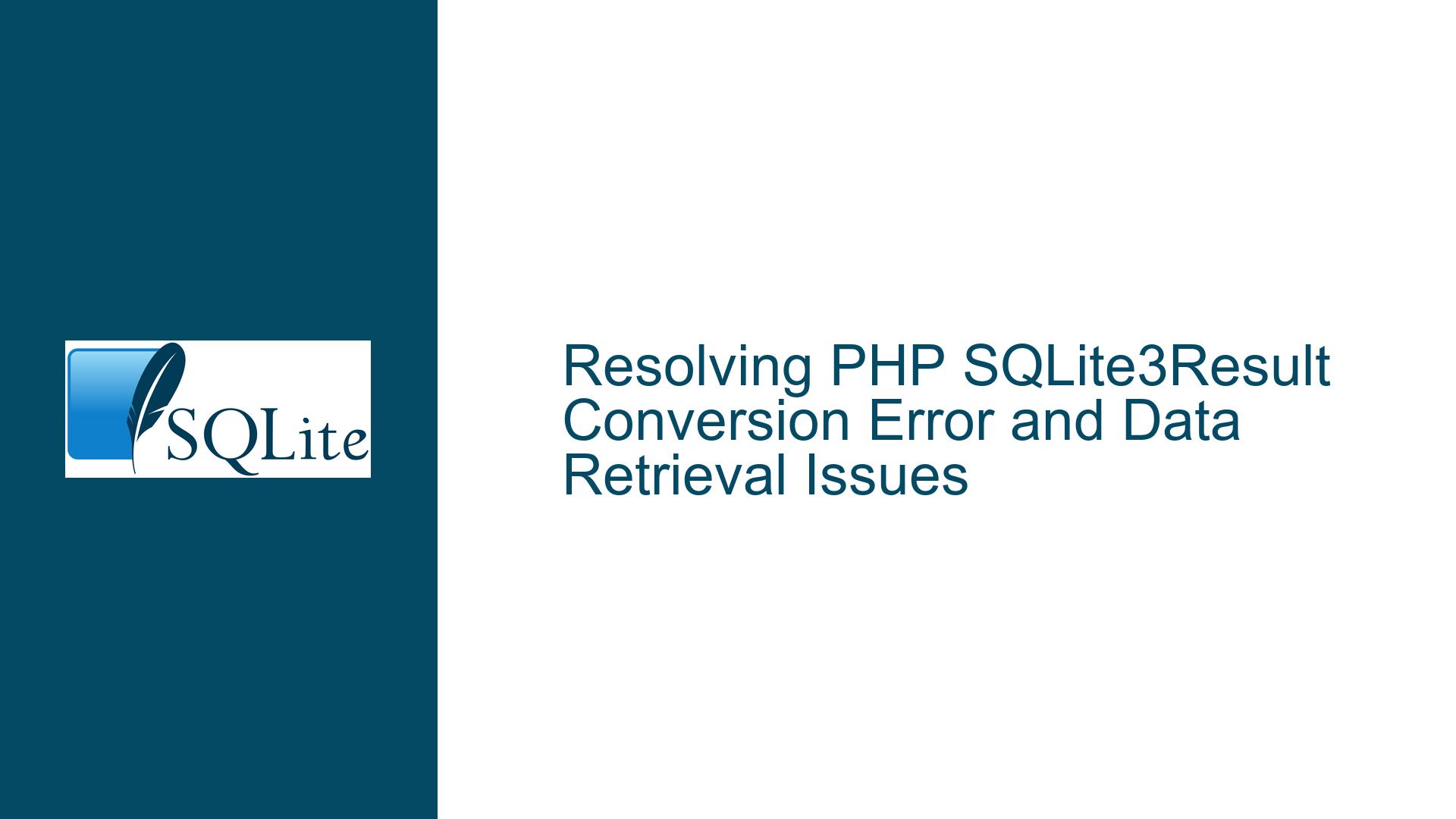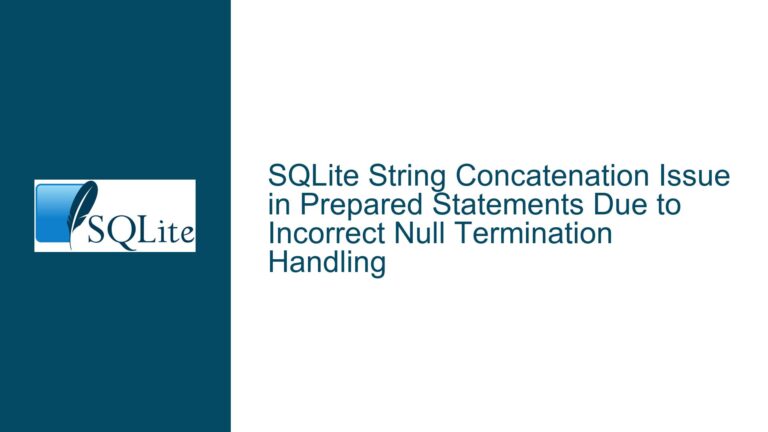Resolving PHP SQLite3Result Conversion Error and Data Retrieval Issues
Issue Overview: SQLite3Result Object Conversion Failure and Improper Data Handling
The core issue arises when attempting to directly output or manipulate an object of type SQLite3Result as if it were a string or scalar value in PHP. This manifests as a fatal error: Uncaught Error: Object of class SQLite3Result could not be converted to string. The error occurs because the developer attempts to print the result object returned by SQLite3::query() without properly extracting data from it. The $db->query('SELECT * FROM inhoud') call returns a resource handle or object representing the query result set – not the actual data. Developers new to SQLite3/PHP integration often misunderstand the need for explicit data extraction via iteration or specific fetch methods.
The problem extends beyond mere error suppression. Even if the fatal error were avoided through type coercion, the underlying data would remain inaccessible without proper traversal of the result set. This indicates a fundamental gap in understanding how SQLite3’s PHP API returns and manages query results. The database connection ($db) is correctly instantiated in the example, but the subsequent handling of $result violates the expected workflow for result set processing. The absence of error checking (e.g., verifying query success) compounds the problem, as silent failures could occur without developer awareness.
Possible Causes: Misuse of SQLite3 PHP API Methods and Result Set Abstraction
1. Incorrect Assumption About Query Return Type
The SQLite3::query() method returns an instance of SQLite3Result, not raw data or a string. Attempting to echo $result triggers PHP’s type juggling system to attempt string conversion, which fails because the SQLite3Result class lacks a __toString() method. This is analogous to trying to print an array directly without iteration – the object’s internal state cannot be meaningfully represented as a string without explicit instruction.
2. Lack of Result Set Traversal
SQL result sets are inherently iterative structures. A SELECT query may return zero, one, or multiple rows. PHP’s SQLite3 API requires developers to explicitly fetch rows using methods like SQLite3Result::fetchArray(), fetchArray(SQLITE3_ASSOC), or iterate through the result set via loops. Without these steps, the data remains encapsulated within the SQLite3Result object, inaccessible to standard output or variable assignment.
3. Absence of Error Handling and Debugging Practices
The original code does not check if the query executed successfully. If the inhoud table were missing or the query syntactically invalid, $db->query() would return false instead of a SQLite3Result object, leading to additional errors when attempting to call methods on a non-object. Furthermore, debugging practices like var_dump() or print_r() are not employed to inspect the structure of $result, which would immediately reveal its object nature.
Troubleshooting Steps, Solutions & Fixes: Proper Result Set Handling and Data Extraction
Step 1: Validate Query Execution and Result Object Integrity
Before attempting data extraction, verify that the query executed successfully and that the result object is valid:
$db = new Database();
$result = $db->query('SELECT * FROM inhoud');
if ($result === false) {
die("Query failed: " . $db->lastErrorMsg());
}
// Proceed only if $result is a valid SQLite3Result object
This prevents method calls on a boolean false value, which would cause a different fatal error. The lastErrorMsg() method provides diagnostic information about SQL syntax errors, missing tables, or permission issues.
Step 2: Iterate Through the Result Set Using Fetch Methods
The SQLite3Result object provides multiple methods for row extraction:
Single-Row Fetch with Column Indexing
Retrieve one row at a time as a numerically indexed array:while ($row = $result->fetchArray(SQLITE3_NUM)) { echo "Column 0: " . $row[0] . ", Column 1: " . $row[1] . PHP_EOL; }Associative Array Fetch for Named Columns
Use column names from the query result:while ($row = $result->fetchArray(SQLITE3_ASSOC)) { echo "ID: " . $row['id'] . ", Name: " . $row['name'] . PHP_EOL; }Combined Numeric and Associative Fetch
Default behavior without mode parameter:$row = $result->fetchArray(); echo $row[0] . " = " . $row['id']; // Both access styles work
Step 3: Fetch All Rows at Once for Array Processing
For smaller result sets, retrieve all rows immediately using a loop or the fetchAll() method (if available in your PHP environment):
$allRows = [];
while ($row = $result->fetchArray(SQLITE3_ASSOC)) {
$allRows[] = $row;
}
// Alternatively, using a custom fetchAll implementation:
function fetchAll(SQLite3Result $result, $mode = SQLITE3_ASSOC) {
$rows = [];
while ($row = $result->fetchArray($mode)) {
$rows[] = $row;
}
return $rows;
}
$allRows = fetchAll($result);
var_dump($allRows);
Step 4: Debugging with Diagnostic Output
Use var_dump() or print_r() to inspect the structure of objects and variables:
$result = $db->query('SELECT * FROM inhoud');
var_dump($result); // Outputs object(SQLite3Result)#2 (0) { ... }
$firstRow = $result->fetchArray();
var_dump($firstRow); // Shows array structure with column data
Step 5: Close Resources and Handle Exceptions
Explicitly free the result set and close the database connection when done:
$result->finalize(); // Optional, as PHP automatically closes resources
$db->close();
For robust applications, wrap database operations in try/catch blocks and utilize PHP’s exception handling for SQLite3 errors:
try {
$db = new SQLite3('oefendatabase.db');
$result = $db->query('SELECT * FROM inhoud');
if (!$result) {
throw new Exception($db->lastErrorMsg());
}
// Process result...
} catch (Exception $e) {
die("Database error: " . $e->getMessage());
}
Final Corrected Code Example
Combining all these steps into a complete solution:
class Database extends SQLite3 {
function __construct() {
$this->open('oefendatabase.db');
}
}
$db = new Database();
// Execute query with error checking
$result = $db->query('SELECT * FROM inhoud');
if ($result === false) {
die("Query failed: " . $db->lastErrorMsg());
}
// Fetch all rows as associative arrays
$data = [];
while ($row = $result->fetchArray(SQLITE3_ASSOC)) {
$data[] = $row;
}
// Output the collected data
echo '<pre>';
print_r($data);
echo '</pre>';
// Cleanup
$db->close();
This approach ensures proper handling of the SQLite3Result object, extracts all rows into a structured array, and provides meaningful output while avoiding type conversion errors.






